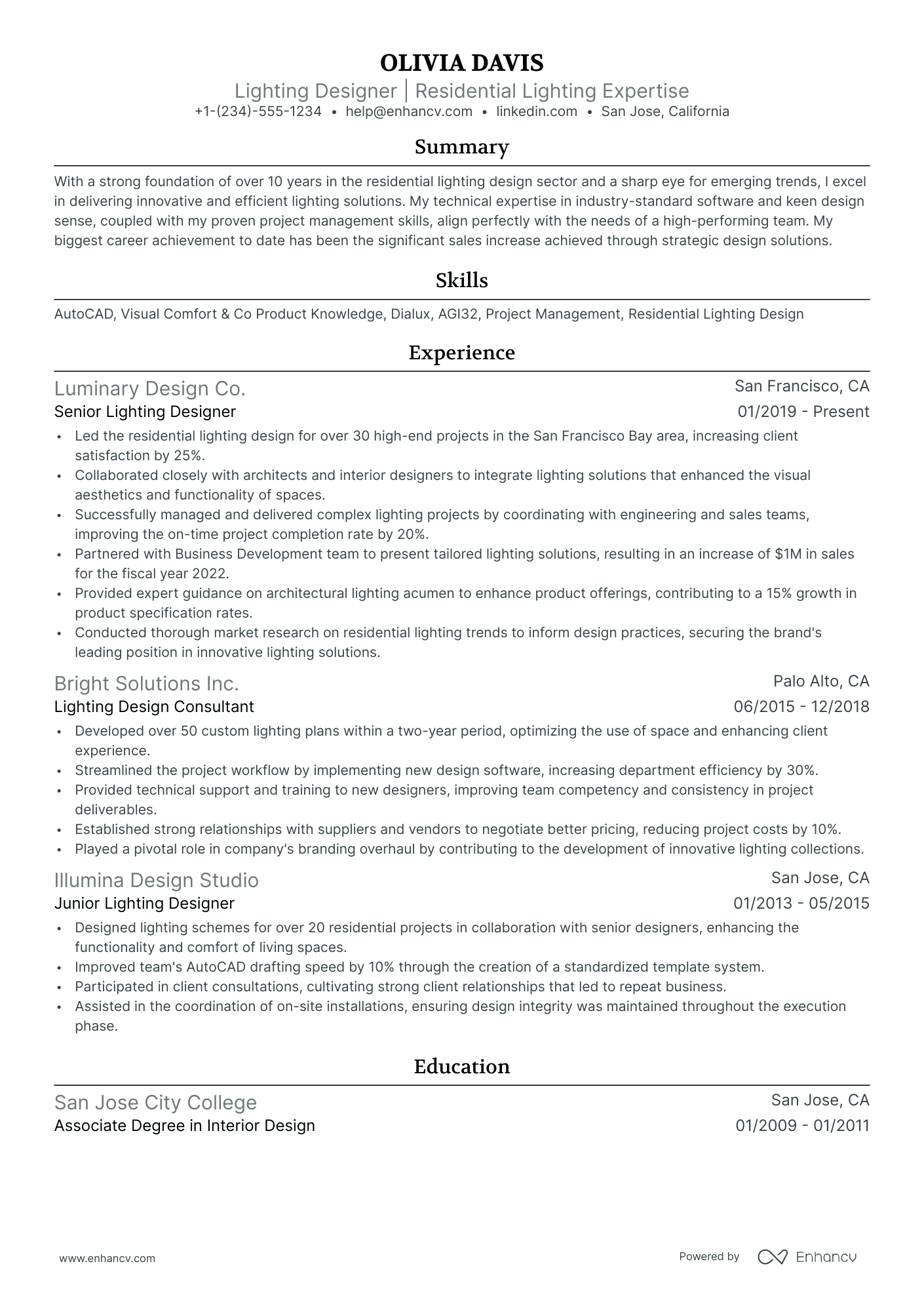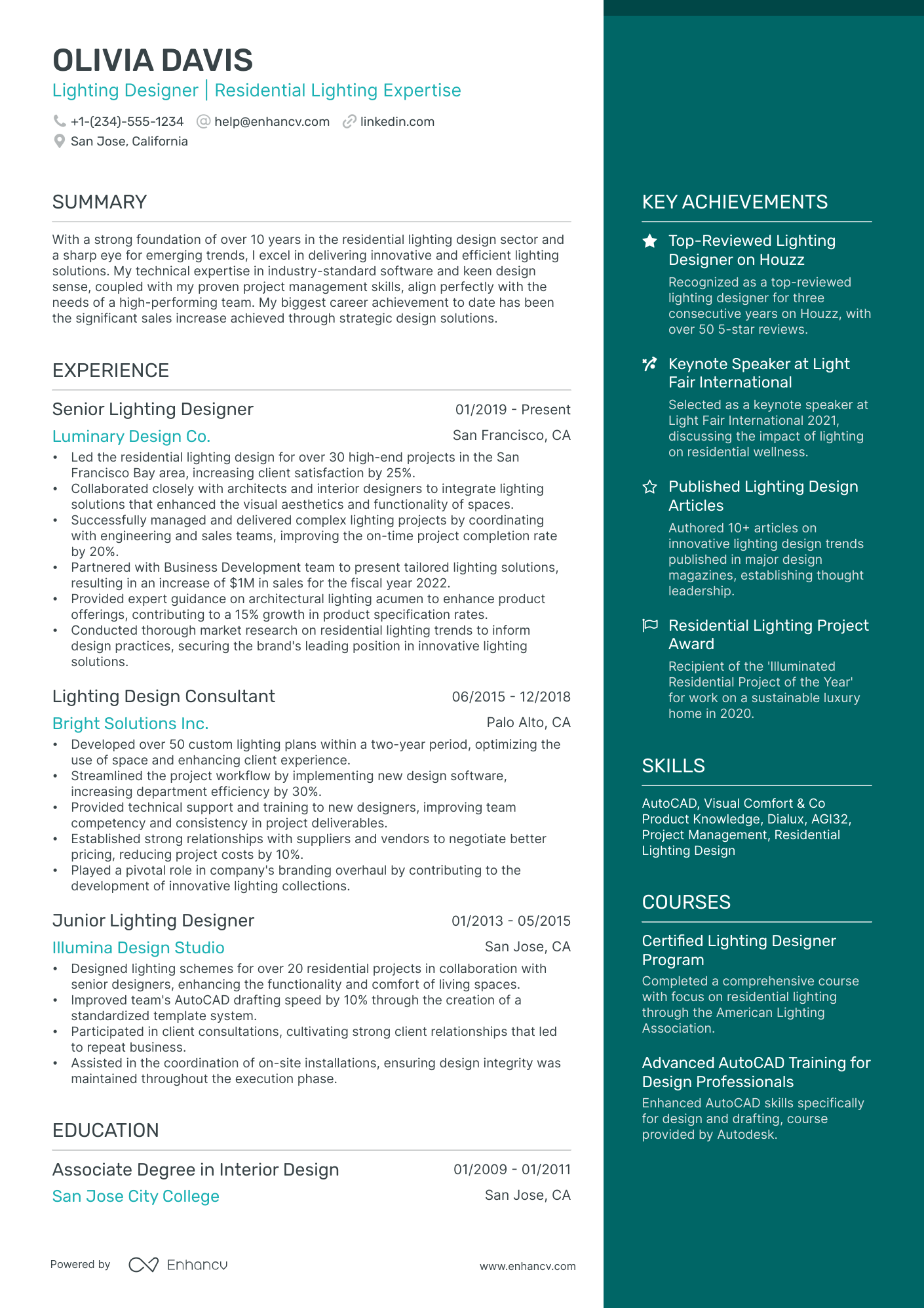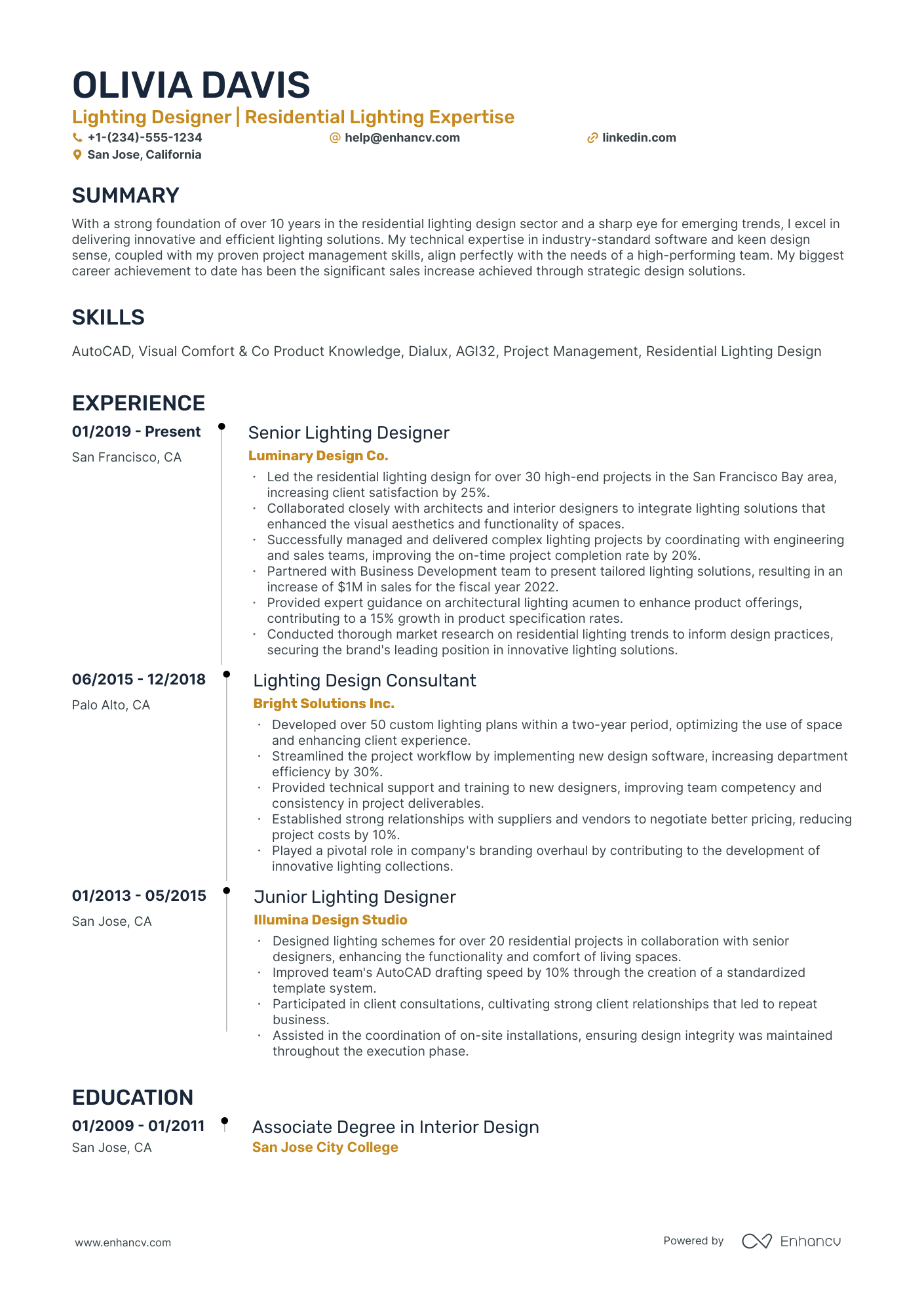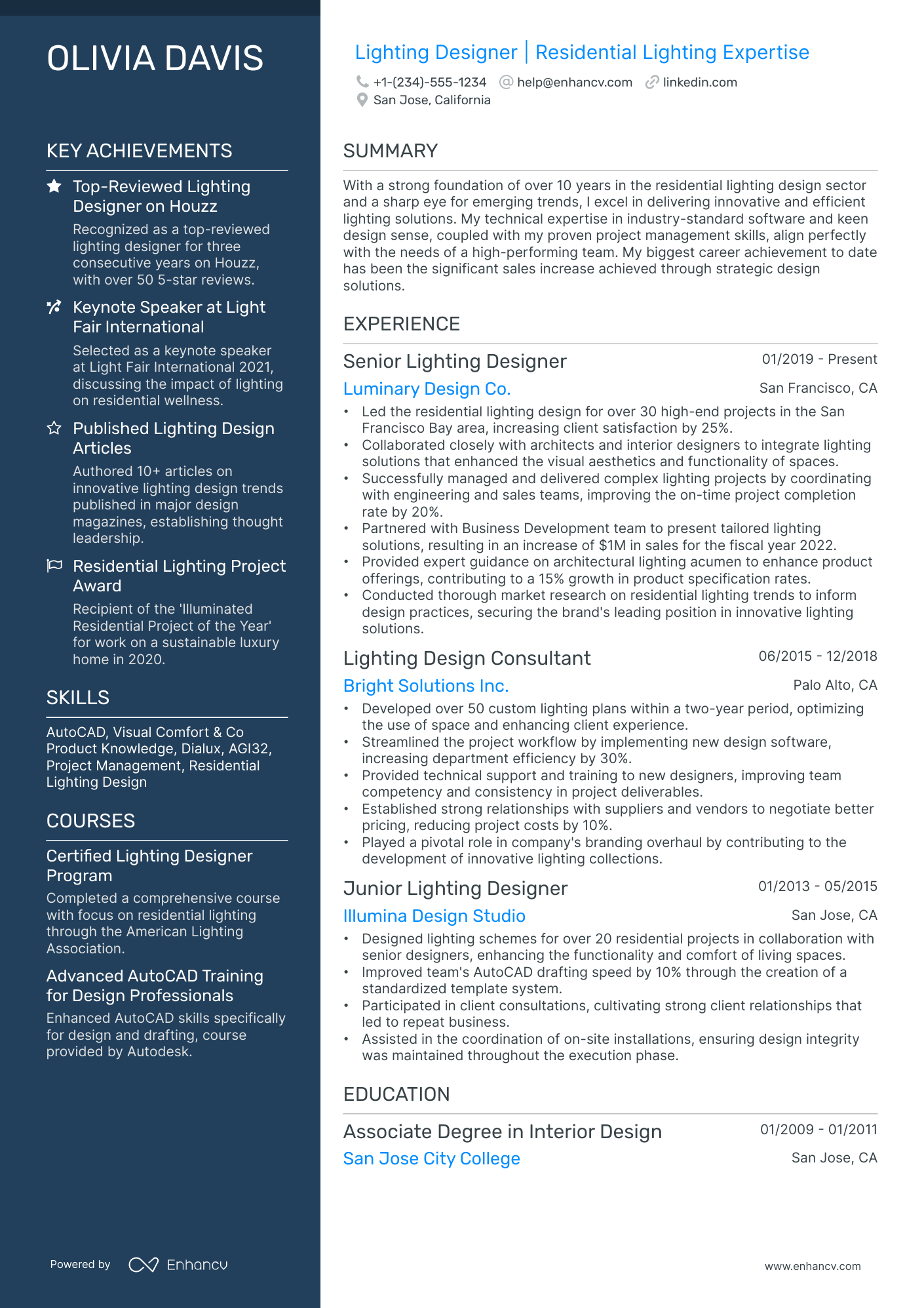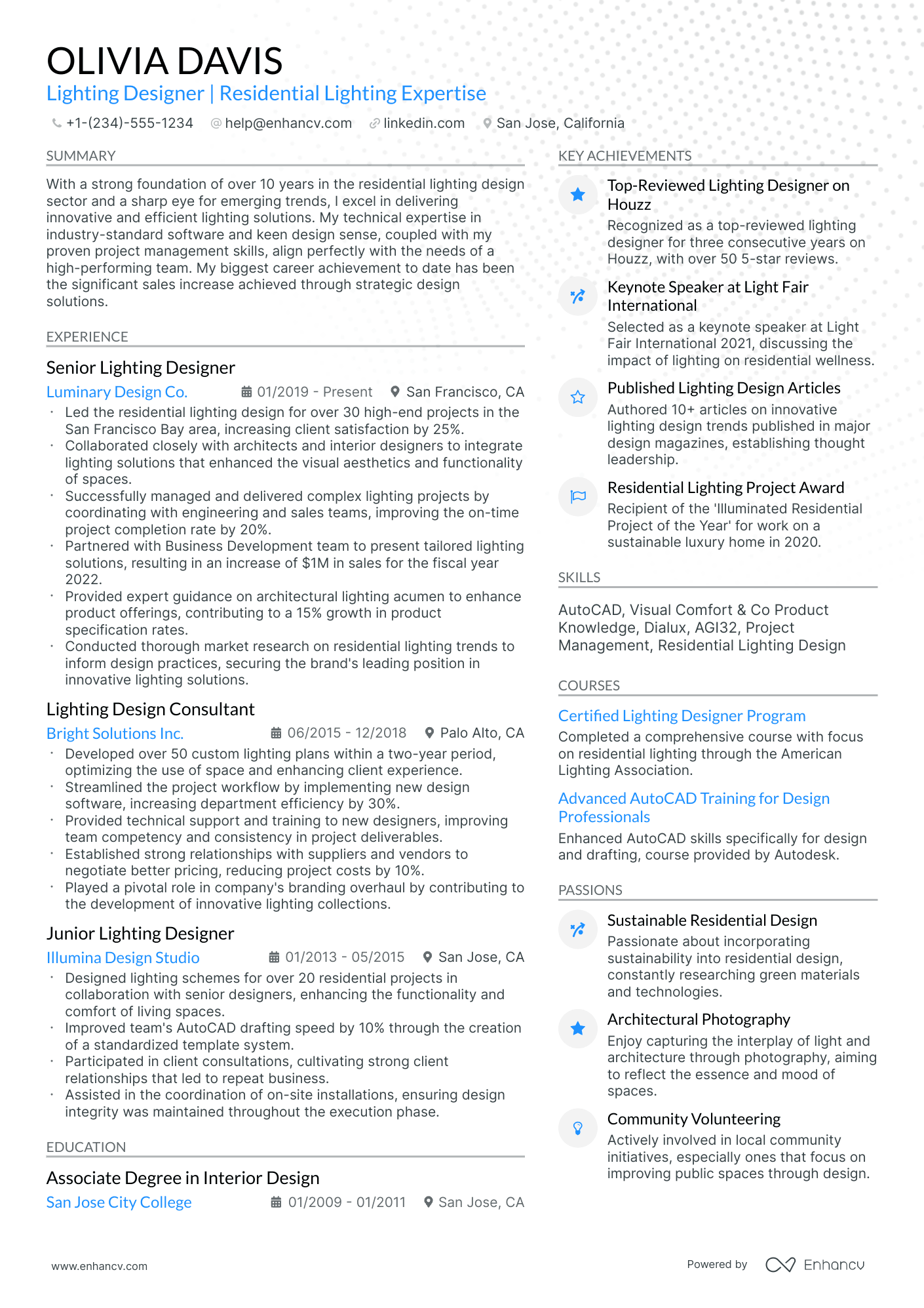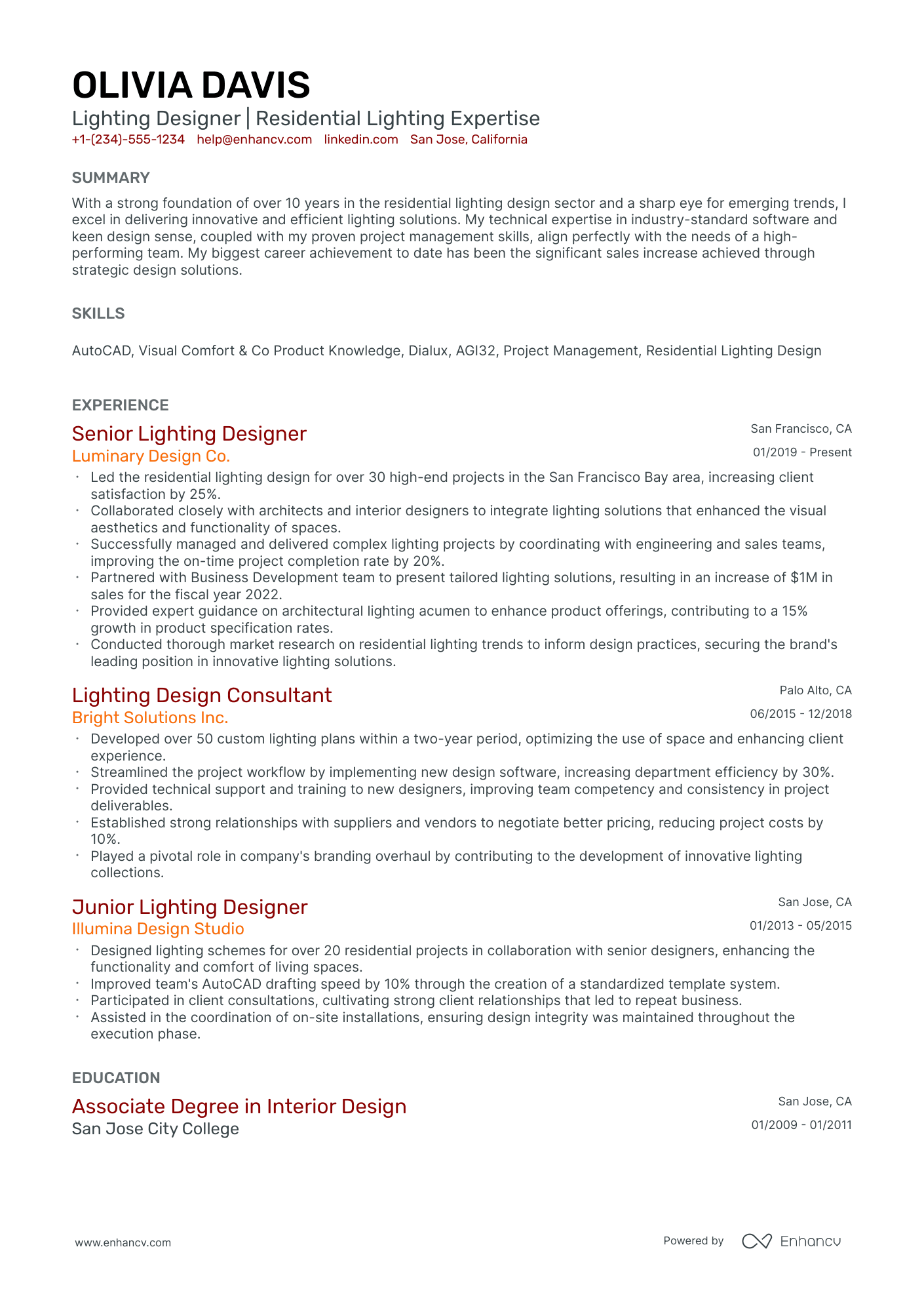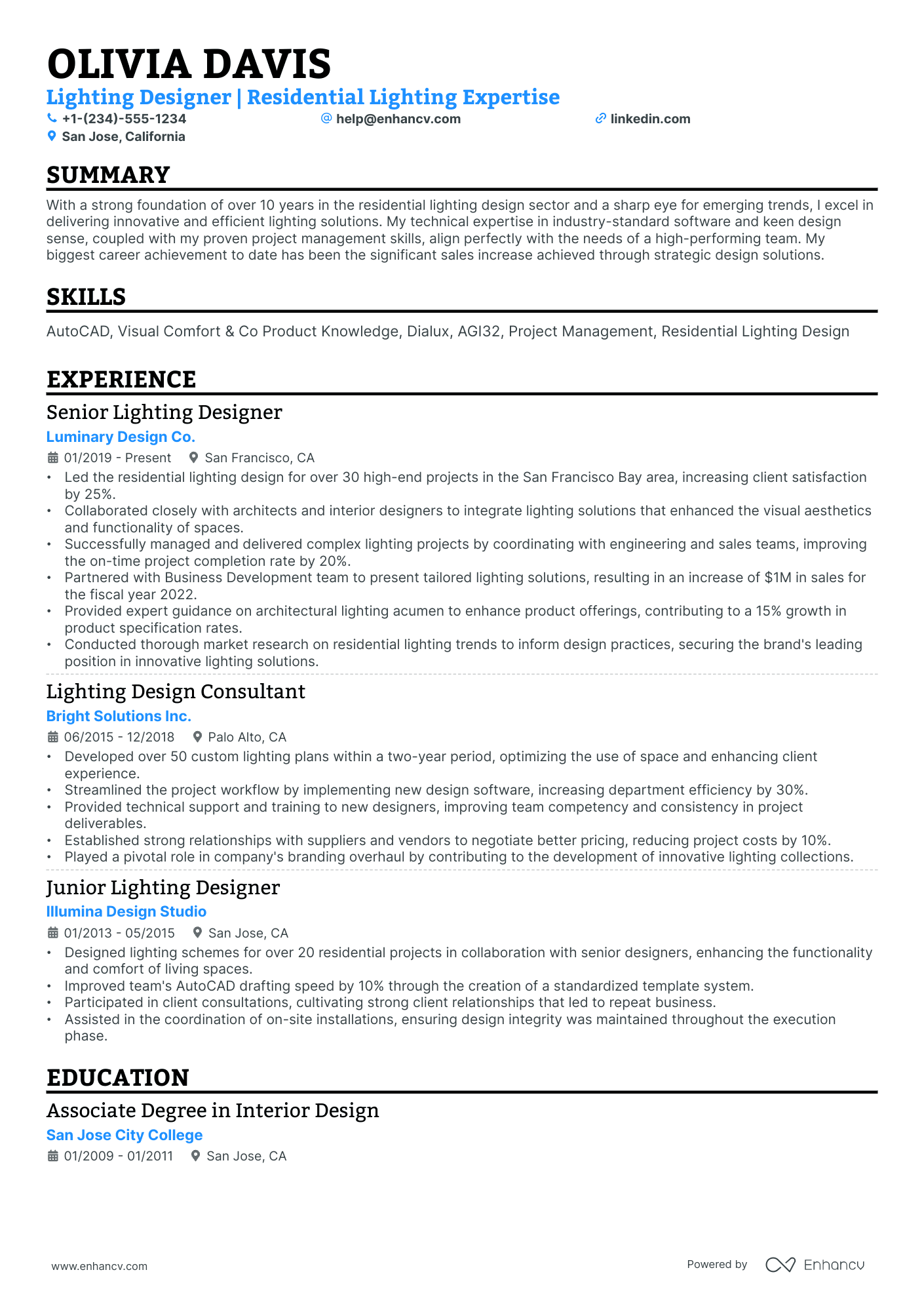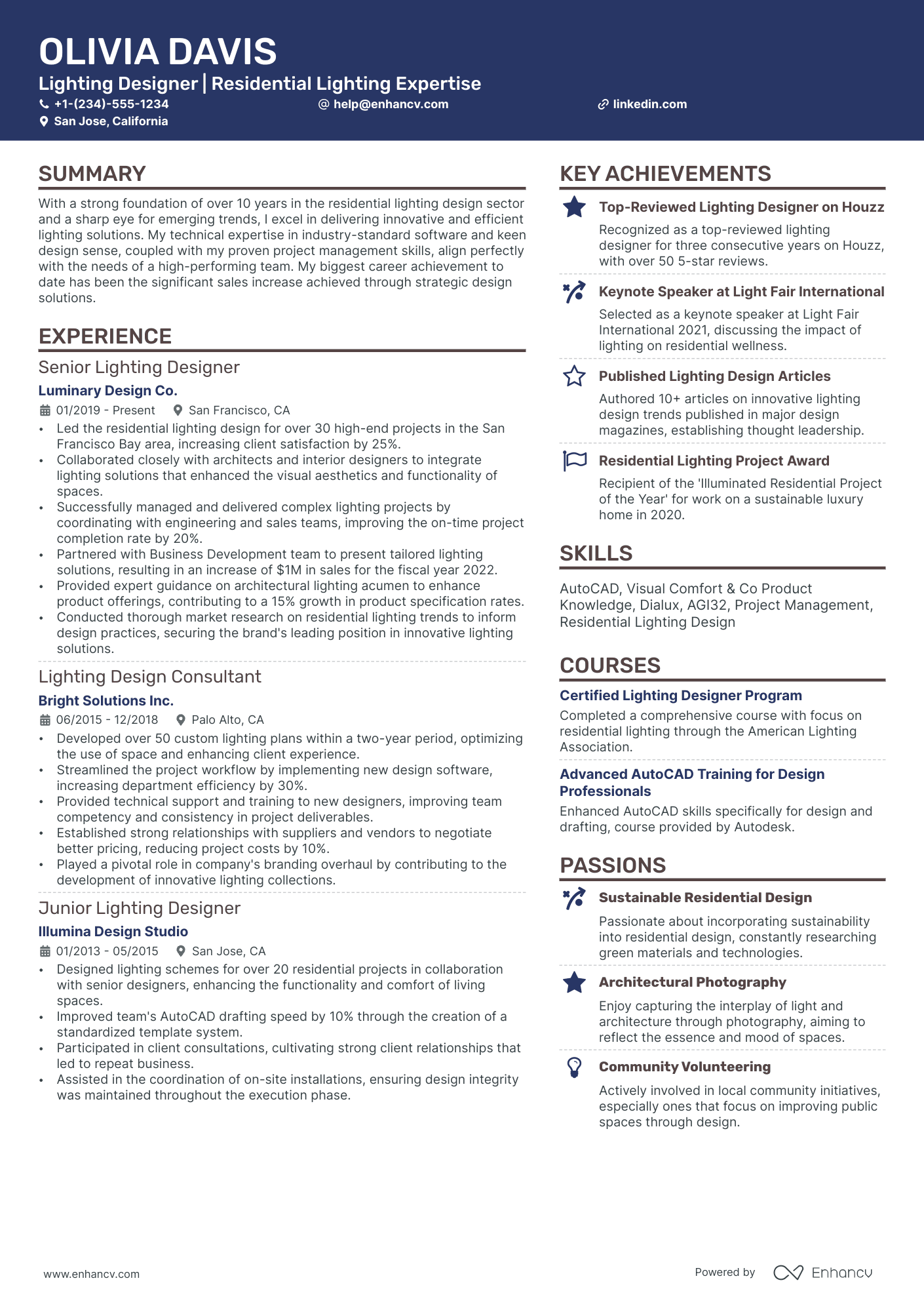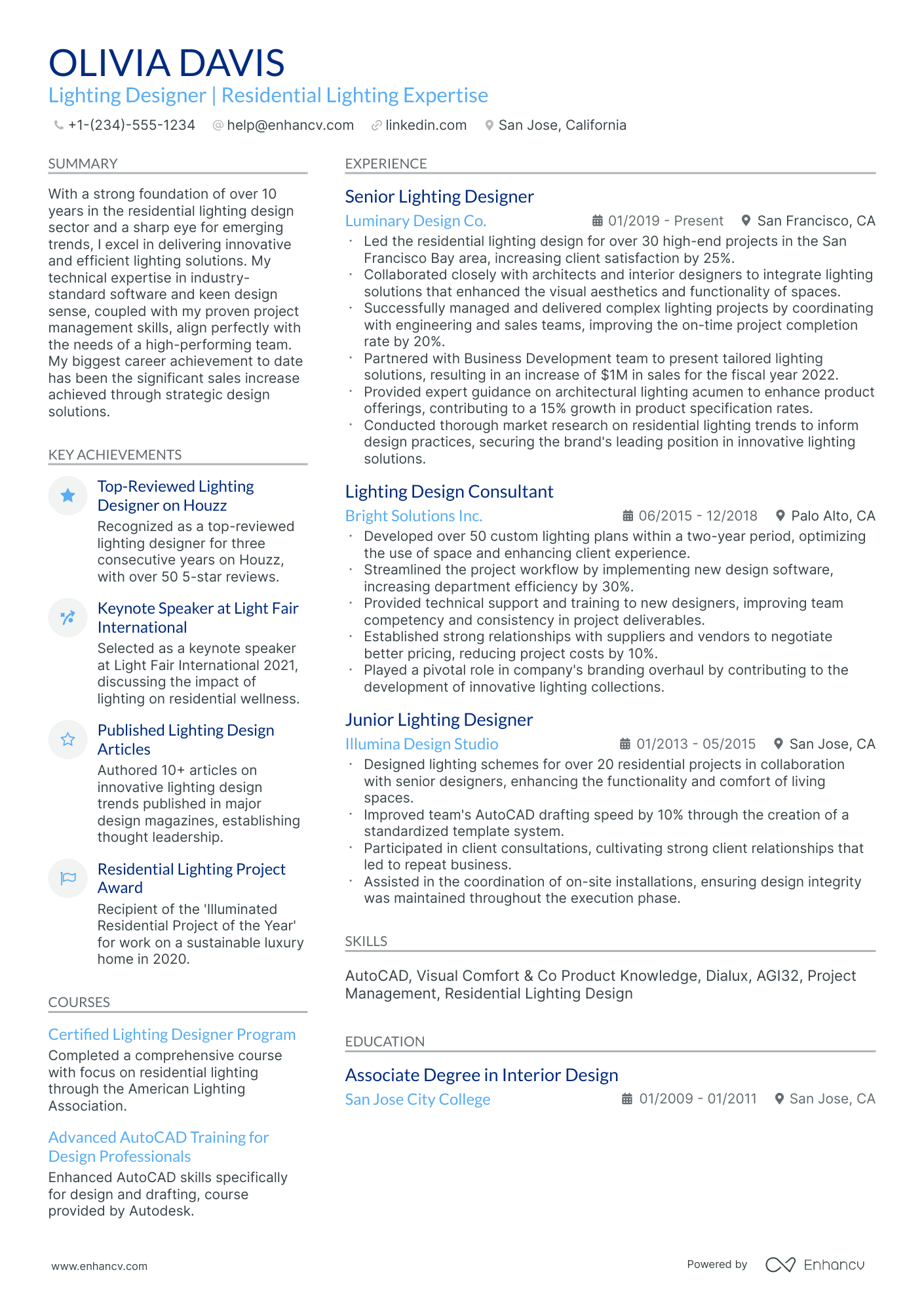As a lighting designer, articulating your unique visual and technical skills in a concise manner on a resume can be a complex challenge. Our guide provides expert advice and actionable tips to help you showcase your lighting design projects and expertise effectively, ensuring your resume stands out to potential employers.
- Which sections do you need to include in your resume to meet recruiters' requirements;
- How to write your lighting designer resume experience section - even if you have don't have little to no work experience;
- Real-life professional examples to guide you how to write the most important lighting designer resume sections;
- Adding even more sections so your lighting designer resume stands out with professionalism and your personality.
We've also selected some of the best (and most relevant) resume guides for the lighting designer role you're applying for:
- Video Production Manager Resume Example
- Art Director Resume Example
- Associate Creative Director Resume Example
- Assistant Video Editor Resume Example
- Visual Designer Resume Example
- Game Designer Resume Example
- Curriculum Designer Resume Example
- Senior Art Director Resume Example
- Product Designer Resume Example
- Creative Services Manager Resume Example
Simple guide to your lighting designer resume format and layout
Successful lighting designer resumes all have one specific characteristic - candidates have invested in a simple resume layout . One that is easy to read, makes a good first impression, and is adapted to their professional experience. There are three distinct resume formats to help you focus on your:
- professional experience - use the reverse-chronological resume format;
- skills and achievements - via the functional skill-based resume format;
- both experience and skills - with a hybrid resume format .
What is more, keep in mind that your resume may be initially assessed by the ATS (Applicant Tracker System) (or the software used by companies in the hiring process). The lighting designer resumes that suit the ATS:
- have a header that includes either a role keyword or the job you're applying for;
- should be no longer than two pages;
- be submitted as PDF, unless specified otherwise.
Think about the market’s preferences – a Canadian resume, for instance, could have a different layout.
Upload & Check Your Resume
Drop your resume here or choose a file. PDF & DOCX only. Max 2MB file size.
PRO TIP
Listing your relevant degrees or certificates on your lighting designer resume is a win-win situation. Not only does it hint at your technical capabilities in the industry, but an array of soft skills, like perseverance, adaptability, and motivation.
Ensure your lighting designer resume stands out with these mandatory sections:
- Header - the section recruiters look to find your contact details, portfolio, and potentially, your current role
- Summary or objective - where your achievements could meet your career goals
- Experience - showcasing you have the technical (and personal) know-how for the role
- Skills - further highlighting capabilities that matter most to the lighting designer advert and your application
- Certifications/Education - staying up-to-date with industry trends
What recruiters want to see on your resume:
- Proficiency in lighting design software (e.g., Dialux, AGi32, or Vectorworks)
- Portfolio of past projects demonstrating creativity and technical skill in lighting design
- Knowledge of current lighting technologies, fixtures, and control systems
- Experience with sustainable design practices and energy-efficient lighting solutions
- Understanding of electrical codes and building regulations specific to lighting installations
What to include in the experience section of your lighting designer resume
The resume experience section is perhaps the most important element in your application as it needs to showcase how your current profile matches the job.
While it may take some time to perfect your lighting designer experience section, here are five tips to keep in mind when writing yours:
- Assess the advert to make a list of key requirements and look back on how each of your past jobs answers those;
- Don't just showcase you know a particular skill, instead, you need proof in the form of tangible results (e.g. numbers, percent, etc.);
- It's perfectly fine to leave off experience items that don't bring anything extra to your skill set or application;
- Recruiters want to understand what the particular value is of working with you, so instead of solely featuring technologies, think about including at least one bullet that's focused on your soft skills;
- Take care with wording each bullet to demonstrate what you've achieved, using a particular skill, and an action verb.
The below lighting designer resume examples can help guide you to curate your professional experience, following industry-leading tips and advice.
- Led a team to design and implement energy-efficient lighting systems for the Green Tower project, reducing the building's energy consumption by 25%.
- Developed a new lighting control system using IoT technology, which was adopted across 30% of corporate client installations, enhancing user experience and reducing maintenance costs.
- Orchestrated the lighting design for the award-winning outdoor concert series, which attracted over 50,000 attendees annually and significantly increased public engagement.
- Created a comprehensive lighting design for a premier shopping center that increased foot traffic by an average of 18% during evening hours.
- Spearheaded the transition to LED technology for a major city's street lighting, resulting in a cost savings of $1.2 million over three years.
- Designed custom lighting fixtures for high-end residential properties, enhancing the aesthetic appeal and market value of these homes.
- Planned and executed the lighting scheme for a 500-seat theater, improving visibility and stage presentation which heightened the overall viewer experience.
- Introduced a dynamic lighting system for a series of corporate events that was praised for its innovation and adaptability to various themes and ambiences.
- Collaborated with cross-functional teams to integrate lighting design in smart home systems, leading to a 40% increase in demand for such integrations from our clients.
- Developed unique lighting concepts for over thirty small to mid-sized restaurants, contributing to a more inviting atmosphere and an average 15% increase in dinner service sales.
- Provided lighting design consulting for a historic hotel renovation, balancing aesthetic sensitivity with modern efficiency standards.
- Successfully navigated complex client requests and tight deadlines to deliver an immersive exhibit lighting design to a local art museum, praised for enhancing visitor engagement.
- Assisted senior designers with the lighting design for a major metropolitan opera house, which received an architectural award for outstanding lighting design.
- Helped to reduce production costs by 20% through the implementation of more efficient workflows and budget-conscious lighting solutions.
- Gained proficiency in various lighting design software, contributing to quicker project turnarounds and enhanced visualization presentations for clients.
- Oversaw the lighting design department, optimizing project workflows and resulting in a 15% reduction in design phase timelines, without compromising quality.
- Pioneered the use of virtual reality presentations for client approvals, significantly increasing client satisfaction and reducing the need for costly mock-ups.
- Curated the lighting design for a series of boutique hotels, which saw a boost in customer reviews relating to ambiance and an average of 22% increase in event bookings.
- Managed the delivery of lighting solutions for a 1000-unit residential complex, adhering to stringent sustainability criteria while maintaining aesthetic integrity.
- Implemented training programs for junior designers, improving team skills and reducing errors in design submissions by 30%.
- Negotiated with vendors to source high-quality fixtures at a 10% lower cost than previous suppliers, enhancing project profitability.
- Incorporated cutting-edge LED technologies into commercial projects, successfully reducing clients' operational costs by an average of 20% annually.
- Leveraged expertise in daylighting to consult on eco-friendly building projects, contributing to several gaining LEED certification.
- Developed a patented lighting system that increased product lifespan by 50% over industry standards, becoming the new flagship offering for the company.
The following content includes information from "O*NET OnLine" by the U.S. Department of Labor, Employment and Training Administration (USDOL/ETA). Used under the CC BY 4.0 license. The data represents the top responsibilities present on the task lists for lighting designer professionals.
Top Responsibilities for Lighting Designer:
- Prepare sketches of ideas, detailed drawings, illustrations, artwork, or blueprints, using drafting instruments, paints and brushes, or computer-aided design equipment.
- Modify and refine designs, using working models, to conform with customer specifications, production limitations, or changes in design trends.
- Confer with engineering, marketing, production, or sales departments, or with customers, to establish and evaluate design concepts for manufactured products.
- Present designs and reports to customers or design committees for approval and discuss need for modification.
- Research production specifications, costs, production materials, and manufacturing methods and provide cost estimates and itemized production requirements.
- Direct and coordinate the fabrication of models or samples and the drafting of working drawings and specification sheets from sketches.
- Investigate product characteristics such as the product's safety and handling qualities, its market appeal, how efficiently it can be produced, and ways of distributing, using, and maintaining it.
- Participate in new product planning or market research, including studying the potential need for new products.
- Read publications, attend showings, and study competing products and design styles and motifs to obtain perspective and generate design concepts.
- Fabricate models or samples in paper, wood, glass, fabric, plastic, metal, or other materials, using hand or power tools.
Quantifying impact on your resume
- Include the total number of lighting designs you have created for live events, showcasing the extent of your experience.
- List the specific sizes of the venues you've worked with to demonstrate the scale of your projects.
- Detail the budget ranges you have managed for various lighting designs, illustrating your financial responsibility.
- Mention the percentage of projects completed under budget, highlighting your cost-effectiveness and efficiency.
- State the number of lighting team members you've supervised or collaborated with, proving your teamwork and leadership skills.
- Quantify the reduction in energy consumption achieved through your lighting designs to emphasize your sustainability efforts.
- Include the variety of lighting technologies you are proficient with by specifying the number, showing your versatility and expertise.
- Report the average increase in audience attendance or client satisfaction in percentages when innovative lighting designs were implemented.
Action verbs for your lighting designer resume
Four quick steps for candidates with no resume experience
Those with less or no relevant experience could also make a good impression on recruiters by:
- Taking the time to actually understand what matters most to the role and featuring this within key sections of their resume
- Investing resume space into defining what makes them a valuable candidate with transferrable skills and personality
- Using the resume objective to showcase their personal vision for growth within the company
- Heavily featuring their technical alignment with relevant certifications, education, and skills.
Remember that your resume is about aligning your profile to that of the ideal candidate.
The more prominently you can demonstrate how you answer job requirements, the more likely you'd be called in for an interview.
Recommended reads:
PRO TIP
If the certificate you've obtained is especially vital for the industry or company, include it as part of your name within the resume headline.
Key hard skills and soft skills for your lighting designer resume
At the top of any recruiter lighting designer checklist, you'd discover a list of technical competencies, balanced with personal skills.
Hard or technical skills are your opportunity to show how you meet the essential responsibilities of the role. The ability to use a particular job-crucial technology or software would also hint to recruiters whether you'd need a prolonged period of on-the-job training - or you'd fit right in the job.
But to land your dream role, you'd also need to demonstrate a variety of soft or people resume skills . Employers care about soft skills as they show how each candidate would fit into the team and company culture.
Both types of skills are specific and to best curate them on your resume, you'd need to:
- Create a skill section within which you showcase your hard and soft skills and present how they help you succeed.
- List specific examples of projects, tasks, or competitions, within which your skill set has assisted your results.
- Soft skills are harder to measure, so think about situations in which they've helped you thrive. Describe those situations concisely, focusing on how the outcome has helped you grow as a professional.
- Metrics of success - like positive ROI or optimized workplace processes - are the best way to prove your technical and people skills.
Take a look at some of lighting designer industry leaders' favorite hard skills and soft skills, as listed on their resumes.
Top skills for your lighting designer resume:
AutoCAD
Adobe Creative Suite
Vectorworks
3D modeling software
Lighting control systems
DMX programming
Luminaires selection
Photometric analysis tools
Renderings software
Technical drawing
Creativity
Attention to detail
Collaboration
Communication
Problem-solving
Time management
Adaptability
Critical thinking
Project management
Interpersonal skills
Next, you will find information on the top technologies for lighting designer professonals from "O*NET OnLine" by the U.S. Department of Labor, Employment and Training Administration (USDOL/ETA). Used under the CC BY 4.0 license.
Top technologies for Lighting Designer’s resume:
- Autodesk Revit
- Dassault Systemes SolidWorks
- Adobe After Effects
- Kapwing
- Adobe Creative Cloud software
- Trimble SketchUp Pro
PRO TIP
If you failed to obtain one of the certificates, as listed in the requirements, but decide to include it on your resume, make sure to include a note somewhere that you have the "relevant training, but are planning to re-take the exams". Support this statement with the actual date you're planning to be re-examined. Always be honest on your resume.
How to include your education and certifications on your resume
We're taking you back to your college days with this part of our guide, but including your relevant higher education is quite important for your resume.
Your degree shows recruiters your dedication to the industry, your recent and relevant know-how, and some form of experience in the field.
Your lighting designer resume education should:
- Include your applicable degrees, college (-s) you've graduated from, as well as start and end dates of your higher education;
- Skip your high school diploma. If you still haven't graduated with your degree, list that your higher education isongoing;
- Feature any postgraduate diplomas in your resume header or summary - this is the perfect space to spotlight your relevant MBA degree;
- Showcase any relevant coursework, if you happen to have less professional experience and think this would support your case in being the best candidate for the role.
As far as your job-specific certificates are concerned - choose up to several of the most recent ones that match the job profile, and include them in a dedicated section.
We've saved you some time by selecting the most prominent industry certificates below.
The top 5 certifications for your lighting designer resume:
- Certified lighting designer (CLD) - International Association of lighting designers (IALD)
- Lighting Certification (LC) - National Council on Qualifications for the Lighting Professions (NCQLP)
- Associate lighting designer (ALD) - International Association of lighting designers (IALD)
- Professional lighting designers' Association Certification (PLDA) - Professional lighting designers’ Association
- IES Lighting Education (IES-LE) - Illuminating Engineering Society (IES)
The content below includes information from "O*NET OnLine" by the U.S. Department of Labor, Employment and Training Administration (USDOL/ETA). Used under the CC BY 4.0 license. The data represents the top associations for lighting designer professionals.
Top US associations for a Lighting Designer professional
- American Society of Mechanical Engineers
- Industrial Designers Society of America
- National Association of Schools of Art and Design
- SAE International
- Society of Manufacturing Engineers
PRO TIP
If you failed to obtain one of the certificates, as listed in the requirements, but decide to include it on your resume, make sure to include a note somewhere that you have the "relevant training, but are planning to re-take the exams". Support this statement with the actual date you're planning to be re-examined. Always be honest on your resume.
Recommended reads:
Best practices to your lighting designer resume summary or objective
To start, how do you know if you should include a resume summary or a resume objective ?
- Resume summaries are ideal for lighting designer professionals with more experience, who'd like to give a quick glimpse of their biggest career achievements in the top one-third of their resumes.
- On the other hand, resume objectives serve as a road map for recruiters. Candidates use the objective to show how their experience aligns with the lighting designer role they're applying for while showcasing the North Star of their career (or where they want to be as a professional in the next couple of years).
The resume summary or resume objective could be the perfect fit for your lighting designer resume. The function of both is to highlight your professionalism succinctly. So, keep your writing specific: include no more than four sentences and target your application to the role. Here's how these specific resume sections help the lighting designer candidates stand out.
Resume summaries for a lighting designer job
- Dedicated lighting designer with over a decade of experience in creating captivating theatrical lighting environments. Expert in leveraging the latest LED technology and automated lighting systems. Recipient of the prestigious Luminary Award for Outstanding Lighting Design in 2020, exemplifying a strong track record of enhancing audience experiences in renowned theaters across New York.
- Passionate architect transitioning to lighting design, aiming to apply 8 years of expertise in spatial design to the nuanced field of illumination. Highly skilled in AutoCAD, Revit, and Dialux, with a proven aptitude for integrating energy-efficient lighting solutions into modern architectural projects. Spearheading the successful retrofit of the city's historical library with LED lighting is a career highlight demonstrative of a commitment to sustainable design.
- Multifaceted interior designer pivoting to lighting design after 7 years of crafting bespoke residential spaces. Proven expertise in 3D modeling and photometric analysis, with a distinctive capability to blend form and function. Recognized for curating an award-winning lighting scheme for a luxury penthouse in Dubai, showcasing a flair for creating atmospheric environments that resonate with clients.
- Aspiring lighting designer with a robust background in electrical engineering, keen on harnessing my technical skills to innovate in the field of lighting. With 5 years of experience in circuit design and a profound appreciation for aesthetic application, I desire to contribute to dynamic projects that prioritize energy efficiency and user experience, like the acclaimed Eco-Light City initiative.
- Recently graduated from the Royal College of Art with a Master's in Lighting Design, I am eager to apply theoretical knowledge and a fresh perspective to practical challenges. My goal is to excel in creating sustainable lighting solutions that align with contemporary trends and to contribute to projects like the Solaris Urban Lighting Movement.
- With a Bachelor’s degree in Theatrical Production and a newfound passion for lighting design, I seek to leverage my understanding of stage dynamics and narrative to influence how lighting is utilized in space. Aiming to merge creative vision with technical prowess in order to contribute to groundbreaking lighting installations that transform public spaces into immersive experiences.
Optimize your resume summary and objective for ATS
Drop your resume here or choose a file.
PDF & DOCX only. Max 2MB file size.
Average salary info by state in the US for lighting designer professionals
Local salary info for Lighting Designer.” Source: My Next Move, National Center for O*NET Development. Accessed 10/15/2024
| State | Average Salary (in USD) |
|---|---|
| US National Average | $76,250 |
| California (CA) | $84,190 |
| Texas (TX) | $81,660 |
| Florida (FL) | $64,870 |
| New York (NY) | $75,200 |
| Pennsylvania (PA) | $71,420 |
| Illinois (IL) | $63,650 |
| Ohio (OH) | $65,690 |
| Georgia (GA) | $75,860 |
| North Carolina (NC) | $76,250 |
| Michigan (MI) | $73,610 |
Miscellaneous lighting designer resume sections for a more personalized approach
Your lighting designer resume can reflect even more upon your personality and best qualities - that is if you decide on including a couple of additional resume sections to support your application.
Some of the best-accepted industry-wide choices include the:
- Resume projects - getting into the outcomes of your most important work, so far;
- Languages on your resume - detailing your proficiency level;
- Special recognitions - dedicated to your most prominent industry awards;
- Hobbies and interests - defining how you spend your free time.
Key takeaways
- The layout of your resume should take into consideration your professional background while integrating vital sections and design elements;
- Highlight your most pertinent achievements for the role all through different sections;
- Be very specific when selecting your certifications, hard skills, and soft skills to showcase the best of your talents;
- Include within the top one-third of your lighting designer resume a header and summary to help recruiters understand your experience and allocate your contact details. A skills box is optional, but it will help you align your expertise with the role;
- Detail the full extent of your professional experience with specific bullets that focus on tasks, actions, and outcomes.
